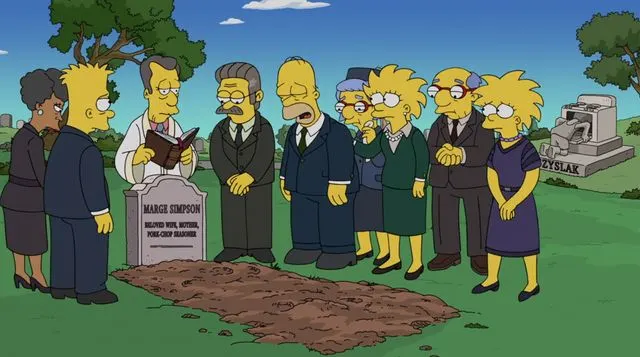Did “The Simpsons” Really Kill Off Marge? Why the Internet’s Melting Down | How The Simpsons Used Content Marketing Services to Break the Internet

Did “The Simpsons” Really Kill Off Marge? Why the Internet’s Melting Down | How The Simpsons Used Content Marketing Services to Break the Internet

“Marge passed before Homer, if you can believe it.”
That one lyric from Sarah McLachlan’s surprisingly emotional number in the Simpsons season 36 finale, "Estranger Things," has sent the fandom spiraling into a frenzy. For a show with over three decades of antics, you’d think nothing could shock audiences anymore. But apparently, killing off Marge - or at least implying it - is where the line gets drawn.
But did Marge Simpson really die? The answer is layered, emotional, and tangled in the series' long-standing approach to time, continuity… and satire. Buckle up.
What Actually Happened in the Finale?
Let’s get one thing clear upfront: yes, technically, Marge dies in the episode. The finale flashes forward to a point far beyond the show's usual timeline. Homer, now a frail and grieving senior, is seen mourning Marge’s death with their adult children - Bart, Lisa, and Maggie - in tow. A tombstone confirms her fate:
"Beloved wife, mother, pork-chop seasoner."
The family then unravels an emotional posthumous message from Marge, left in video form, urging her children to reconnect. From there, we spiral into a heartwarming (and admittedly absurd) family journey that includes a rebooted Itchy and Scratchy, a rogue retirement home run by Bart, and — in the kicker - Marge sharing a romantic moment with Ringo Starr in heaven.
That’s right: Ringo. Starr. In. Heaven.
Why Is Everyone Losing Their Minds?
Because this is Marge.
Marge is The Simpsons. She’s the voice of reason, the moral compass, the hair that defies gravity and logic. Watching Homer die in a flash-forward? Almost expected. Seeing Marge beat him to the grave? That’s a gut punch.
Even the show acknowledges this reversal of expectations. McLachlan’s song nods to the disbelief with the line about Homer outliving Marge, tapping into a universal sentiment: if anyone was going to go the distance, it was Marge.
But here's the thing - and it’s very important - the entire episode is non-canon.

Is Marge Really Dead? (Spoiler)
No. She’s not dead in any way that affects the show's ongoing plot.
Like many flash-forward episodes throughout the series' 36-year history, "Estranger Things" is essentially speculative fiction. It explores a “what if” timeline - an imaginative alternate future. It doesn't impact the show’s present timeline or continuity.
This isn’t Maude Flanders dies by t-shirt cannon levels of permanence. This is The Simpsons doing what it does best: bending time, logic, and emotion to craft a layered story that provokes thought (and memes).
The Internet Reacts
The uproar following the finale is reminiscent of 2013’s Family Guy drama when Brian Griffin was killed off, only to be resurrected two episodes later. The backlash was fierce — and loud. Seth MacFarlane himself commented on it:
“We thought it would create a little bit of a stir, but the rage wasn’t something we counted on.”
The same phenomenon is playing out here. Fans care. And caring equals engagement. Which, in turn, equals shares, posts, threads, TikToks, memes - and yes, even well-timed blog articles optimized with content marketing services.
It’s no coincidence that this entire storyline hit just as the series heads into its 37th season - and with four more seasons already greenlit, The Simpsons isn’t going anywhere. And neither is Marge.
So... Was This Just a Marketing Stunt?
You might be wondering if this was all part of some elaborate engagement strategy. In a sense, yes - but not in a cynical way.
The Simpsons team has mastered the art of staying relevant through cultural commentary, internet virality, and self-awareness. A dramatic flash-forward episode fits right into that formula.
And guess what? That’s where content marketing services come in. Let’s break it down:
- This episode got people talking.
- It sparked debate and controversy.
- It encouraged revisits to past episodes.
- It boosted streaming engagement on Hulu.
- It led to media outlets (hi) producing SEO-rich articles.
- And, crucially, it ensured that The Simpsons remained in the pop culture spotlight.
This is content strategy at its most refined — a case study for content marketing services that thrive on emotion, nostalgia, and fandom.
The Genius Behind the Emotional Bait
A fake-out death in a beloved series isn’t new, but the way The Simpsons handled it adds layers:
- Humor: A heaven buffet? A Ringo Starr wedding? That’s Simpsons gold.
- Emotion: The funeral. The will. The video. It hit harder than expected.
- Meta Commentary: The ending scene features a rebooted Itchy and Scratchy — possibly a nod to media reboots and franchise fatigue. It’s subtle, but smart.
If this episode had simply killed off Marge without nuance or meaning, the reaction would have been different. But instead, it turned into a multi-platform conversation, precisely the kind of outcome content marketing services dream of engineering.
What Happens Next?
Simple: Marge is still alive in Springfield, canonically speaking. The show will carry on, business as usual, with donuts, D'ohs, and dysfunctional dynamics in full force.
But the legacy of this episode will linger — not just for fans but for creators, strategists, and anyone involved in long-form storytelling and brand evolution. It's a testament to how legacy media can stay fresh, relevant, and emotionally resonant even after 36 seasons.
If you’re managing any kind of long-term brand, take notes. Content marketing services that know how to use nostalgia, surprise, and emotional depth — while still remaining playful — are the ones that win.
What You Can Learn From This If You’re in Media (Or Just Curious)
If this entire Marge death saga has taught us anything, it’s that storytelling still rules. But it’s not just what you tell — it’s how you tell it, and when.
Here’s how content marketing services align with this episode’s strategy:
- Build suspense: Tease outcomes that challenge expectations.
- Use emotion: Sadness, joy, disbelief — make people feel.
- Be self-aware: Know your audience. Know what will shock them.
- Integrate cross-platform: The buzz happened across Twitter, Reddit, YouTube, and blogs — just like good content marketing.
- Keep evolving: Even after 36 years, The Simpsons can still shock, laugh, and trend.
Final Thoughts
So, is Marge Simpson gone forever? No. But did The Simpsons just drop one of its most impactful emotional episodes in years? Absolutely.
And in doing so, they not only got fans talking — they reminded media strategists everywhere of the power of storytelling done right. Whether you're producing TV, writing blogs, or managing a brand, there's a lesson here: narrative matters.
And if you’re still wondering how a decades-old cartoon managed to break the internet in 2025? Look no further than the power of smart, timely, emotionally charged storytelling — the cornerstone of modern content marketing services.
And yes, you’ll see Marge next season. But will things ever feel the same again? That’s the beauty of it.







